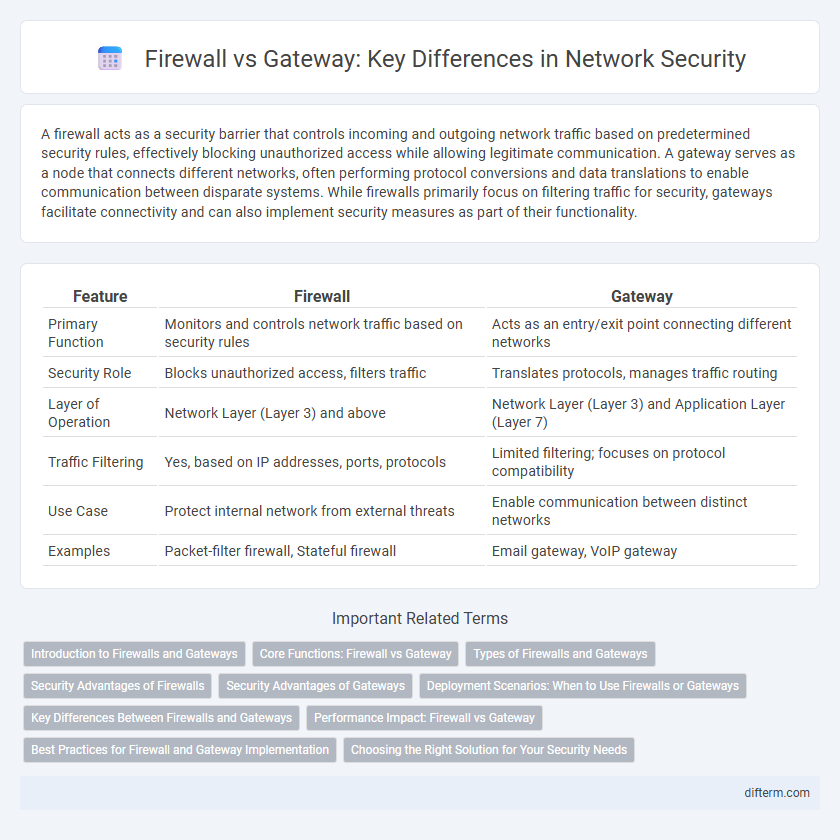A firewall acts as a security barrier that controls incoming and outgoing network traffic based on predetermined security rules, effectively blocking unauthorized access while allowing legitimate communication. A gateway serves as a node that connects different networks, often performing protocol conversions and data translations to enable communication between disparate systems. While firewalls primarily focus on filtering traffic for security, gateways facilitate connectivity and can also implement security measures as part of their functionality.
Table of Comparison
| Feature | Firewall | Gateway |
|---|---|---|
| Primary Function | Monitors and controls network traffic based on security rules | Acts as an entry/exit point connecting different networks |
| Security Role | Blocks unauthorized access, filters traffic | Translates protocols, manages traffic routing |
| Layer of Operation | Network Layer (Layer 3) and above | Network Layer (Layer 3) and Application Layer (Layer 7) |
| Traffic Filtering | Yes, based on IP addresses, ports, protocols | Limited filtering; focuses on protocol compatibility |
| Use Case | Protect internal network from external threats | Enable communication between distinct networks |
| Examples | Packet-filter firewall, Stateful firewall | Email gateway, VoIP gateway |
Introduction to Firewalls and Gateways
Firewalls function as security systems that monitor and control incoming and outgoing network traffic based on predetermined security rules, effectively acting as a barrier between trusted and untrusted networks. Gateways serve as critical network nodes that connect different networks using various protocols, facilitating communication while often incorporating security features such as packet filtering and network address translation. Understanding the distinct roles of firewalls and gateways is essential for designing robust network security architectures that protect against unauthorized access and data breaches.
Core Functions: Firewall vs Gateway
Firewalls primarily function by inspecting and filtering incoming and outgoing network traffic based on predefined security rules to prevent unauthorized access and threats. Gateways operate at multiple protocol layers, managing communication and data translation between different networks or systems while also enforcing security policies. Firewalls focus on blocking unauthorized traffic, whereas gateways facilitate secure connectivity and protocol mediation across diverse network environments.
Types of Firewalls and Gateways
Packet-filtering firewalls inspect packets at the network layer, blocking or allowing traffic based on IP addresses and ports, while stateful inspection firewalls track the state of active connections for more dynamic filtering. Application gateways, also known as proxy firewalls, operate at the application layer, filtering traffic specific to an application protocol like HTTP or FTP, offering granular security controls. Network gateways serve as points that connect different networks and may incorporate firewall functions to monitor and control incoming and outgoing traffic based on configured security policies.
Security Advantages of Firewalls
Firewalls provide robust security by filtering incoming and outgoing traffic based on predefined security rules, effectively preventing unauthorized access and cyber threats. Unlike gateways, firewalls offer advanced features such as stateful inspection, intrusion detection, and virtual private network (VPN) support, enhancing perimeter defense. These capabilities ensure comprehensive protection against malware, DDoS attacks, and data breaches, maintaining network integrity and confidentiality.
Security Advantages of Gateways
Gateways provide enhanced security by inspecting and filtering traffic at multiple layers of the OSI model, enabling more comprehensive threat detection compared to traditional firewalls. They support deep packet inspection, application-level filtering, and protocol validation, which significantly reduce the risk of advanced persistent threats and unauthorized access. Integration with identity management and encryption capabilities further strengthens network perimeter defense and data confidentiality.
Deployment Scenarios: When to Use Firewalls or Gateways
Firewalls are ideal for network perimeter defense, filtering traffic based on pre-established security rules to block unauthorized access and prevent cyber threats. Gateways function as intermediaries that manage and translate communication protocols between different networks or systems, making them essential for secure data exchange in complex environments. Choose firewalls for robust access control and intrusion prevention at network boundaries, and deploy gateways when seamless protocol mediation and secure connectivity between disparate systems are required.
Key Differences Between Firewalls and Gateways
Firewalls control network traffic based on predefined security rules, acting as barriers that prevent unauthorized access and protect internal networks from external threats. Gateways serve as access points that interconnect different networks, often translating protocols and managing traffic flow between distinct environments. While firewalls primarily enforce security policies, gateways emphasize connectivity and communication across heterogeneous systems.
Performance Impact: Firewall vs Gateway
Firewalls generally introduce higher latency compared to gateways due to intensive packet inspection and filtering processes that enforce security policies at multiple network layers. Gateways, serving as protocol translators and connection points, typically exhibit lower performance impact by handling less complex traffic management tasks. Optimizing firewall configurations and employing hardware acceleration can mitigate performance degradation while maintaining robust security controls.
Best Practices for Firewall and Gateway Implementation
Implementing firewalls involves segmenting networks, defining strict access control lists, and regularly updating rulesets to effectively block unauthorized traffic while allowing legitimate communication. Gateways require configuring encryption protocols and robust authentication mechanisms to securely manage data transmission between different networks or systems. Employing both firewalls and gateways in a layered security strategy enhances overall protection by combining perimeter defense with secure data exchange controls.
Choosing the Right Solution for Your Security Needs
Firewalls serve as critical security barriers that filter incoming and outgoing network traffic based on predetermined security rules, effectively preventing unauthorized access. Gateways operate at the network protocol level, managing data traffic between different networks and providing additional features like protocol translation and data encryption. Selecting between a firewall and a gateway depends on the specific security requirements, such as the need for granular traffic control or secure data transmission across diverse network environments.
Firewall vs Gateway Infographic

 difterm.com
difterm.com